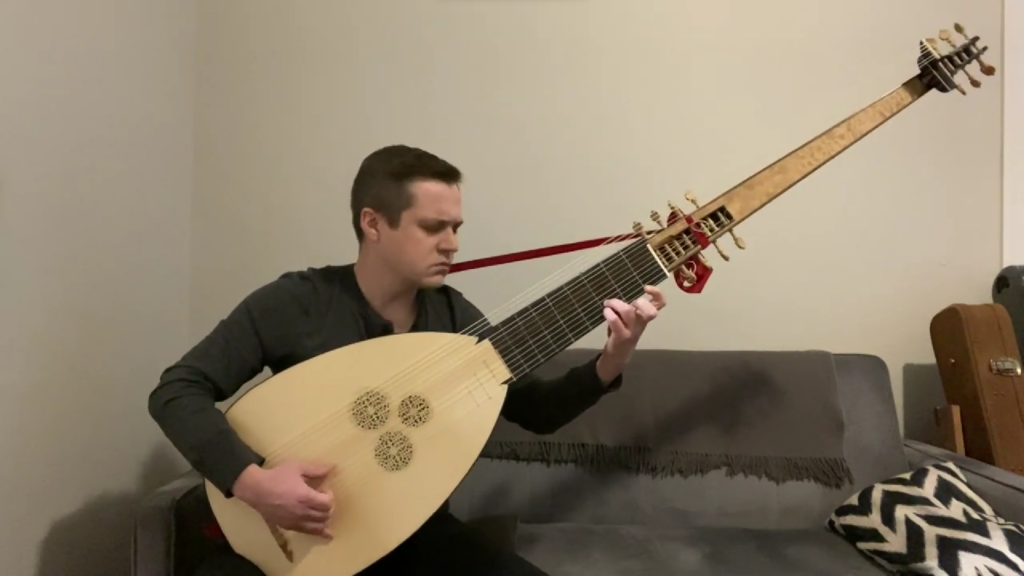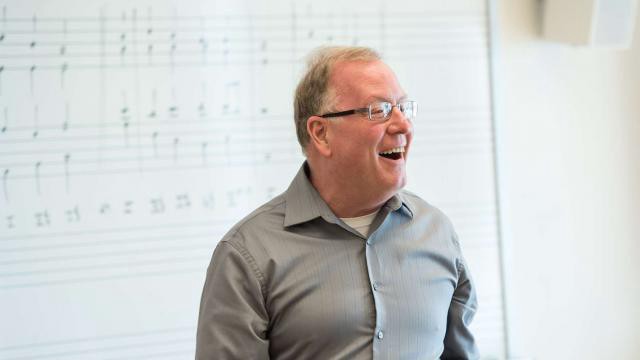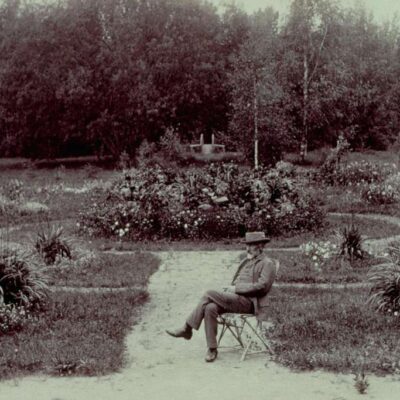
Joining California Symphony for HANDEL—RIVERS OF INSPIRATION is Jon Mendle on the rarely-seen theorbo. Jon has toured with Yo-Yo Ma and the Silk Road Ensemble, performed in Carnegie Hall, and won second prize at the 2021 Concorso di Musica Antica “Maurizio Pratola” international lute competition. We talked to Jon to learn more about his career on baroque instruments and what it’s like to perform on a larger-than-life instrument like the theorbo.
Our November concert features a theorbo. Can you tell us what that is? What does it sound like? How do you hold / play it?
A theorbo is a type of bass lute that was in use in the 17th and 18th centuries. The theorbo is notable for its size – it’s the largest member of the lute family, and features two peg boxes: one for the fretted strings, and one for the extended basses. The extended strings are tuned like a scale, and they essentially function like harp strings. You hold it in a pretty standard lute/guitar type of position, although it does take some getting used to at first due to the size of the bowl! Many players use a strap for added stability.
Is it heavy? How do you transport it, and what happens if it needs repair?
The instrument itself is lighter than you might expect, although the neck does carry some weight as it’s solid wood. The body of the theorbo is built as lightly as possible for the best sound quality. I transport it in a hard case – I bought the biggest theorbo that would still fit comfortably in my car! If it needs repair, I’m lucky to live near the luthier who built mine, Mel Wong, who is a wonderful builder of historical plucked instruments in San Francisco.
How did you begin playing the theorbo? Is it something you “graduated to” after mastering another instrument?
I began taking lessons on lutes and early guitars with Richard Savino when I went back to the San Francisco Conservatory of Music for my Professional Studies Diploma in 2017. I also had the opportunity to study theorbo at the San Francisco Early Music Society Summer Baroque Workshops with Nigel North. Generally, one wouldn’t start on theorbo, but the challenges are largely the same as any plucked instrument. If you want to play well, you have to put in the work!
Are theorbists in demand? Do you travel a lot?
Theorbists are in demand because there are so few of us! And due to the fact that the instrument was in common use in the baroque era but there are so few today. I don’t travel a lot with the theorbo, at least not yet. I’ve been lucky to play continuo pretty regularly on theorbo, lute, and baroque guitar around the Bay Area on my theorbo since acquiring it.
Will you be centerstage in the orchestra or mixed in eg with the basses in the back?
I’ll have to see what the music director suggests – every concert has been different. Usually the conductor likes me to be visible, just because the theorbo is so unusual.
Anything you’d like our readers to know about you or your instrument?
Historically, there would have likely been multiple plucked continuo instruments – unfortunately I can’t clone myself, so I’ll be playing as loud as I can!
See Jon and his theorbo in action on Handel’s Water Music at HANDEL—RIVERS OF INSPIRATION, Saturday, November 11 at 7:30 p.m. and Sunday, November 12 at 4 p.m. at the Lesher Center for the Arts in Walnut Creek. Tickets are $45 to $90 and $20 for students 25 and under, and include a free 30-minute pre-concert talk starting one hour before the performance. Buy tickets online or call or visit the Lesher Center Ticket Office at 925.943.7469, Wed – Sun, 12:00 noon to 6:00 p.m.


